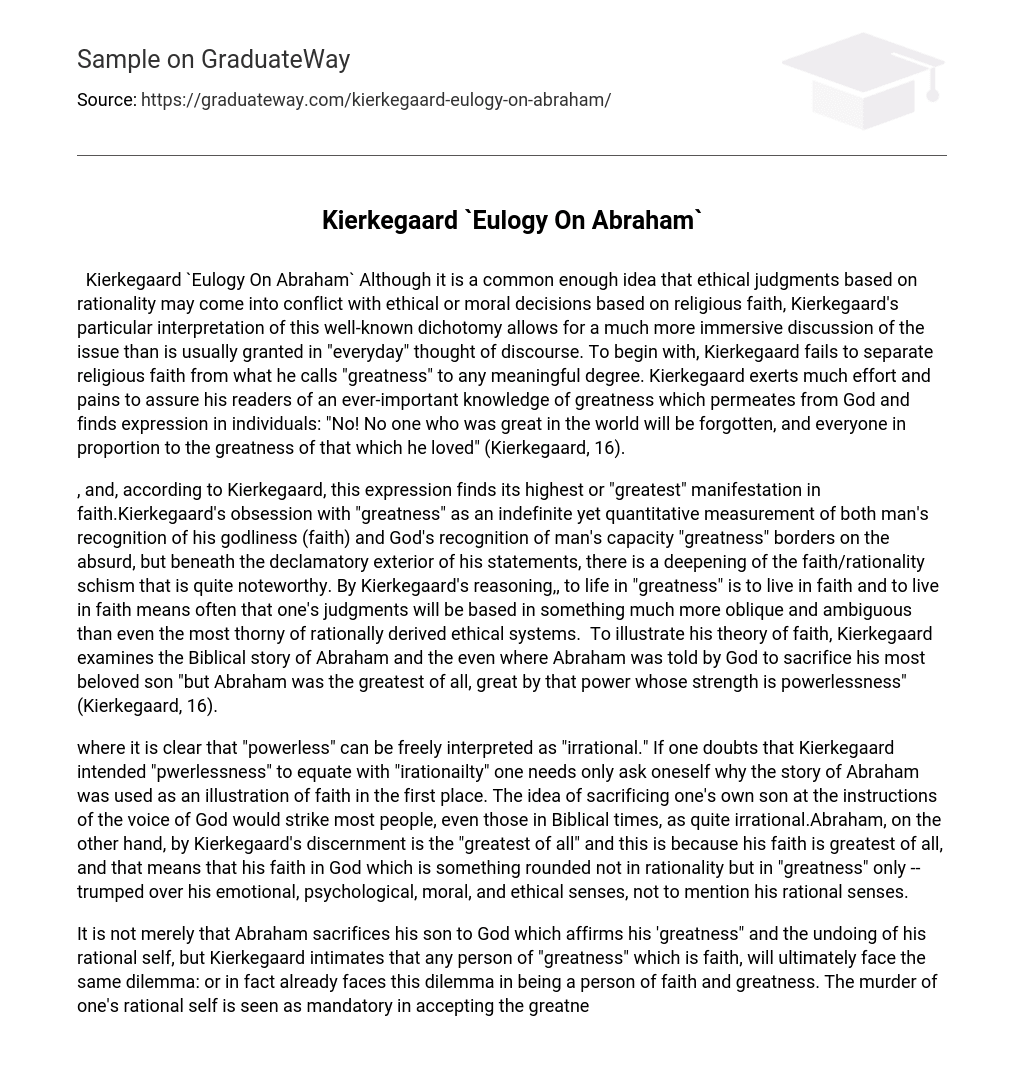Although it is a common enough idea that ethical judgments based on rationality may come into conflict with ethical or moral decisions based on religious faith, Kierkegaard’s particular interpretation of this well-known dichotomy allows for a much more immersive discussion of the issue than is usually granted in “everyday” thought of discourse.
To begin with, Kierkegaard fails to separate religious faith from what he calls “greatness” to any meaningful degree. Kierkegaard exerts much effort and pains to assure his readers of an ever-important knowledge of greatness which permeates from God and finds expression in individuals: “No! No one who was great in the world will be forgotten, and everyone in proportion to the greatness of that which he loved” (Kierkegaard, 16), and, according to Kierkegaard, this expression finds its highest or “greatest” manifestation in faith.
Kierkegaard’s obsession with “greatness” as an indefinite yet quantitative measurement of both man’s recognition of his godliness (faith) and God’s recognition of man’s capacity “greatness” borders on the absurd, but beneath the declamatory exterior of his statements, there is a deepening of the faith/rationality schism that is quite noteworthy.
By Kierkegaard’s reasoning,, to life in “greatness” is to live in faith and to live in faith means often that one’s judgments will be based in something much more oblique and ambiguous than even the most thorny of rationally derived ethical systems. To illustrate his theory of faith, Kierkegaard examines the Biblical story of Abraham and the even where Abraham was told by God to sacrifice his most beloved son “but Abraham was the greatest of all, great by that power whose strength is powerlessness” (Kierkegaard, 16).
where it is clear that “powerless” can be freely interpreted as “irrational.” If one doubts that Kierkegaard intended “pwerlessness” to equate with “irationailty” one needs only ask oneself why the story of Abraham was used as an illustration of faith in the first place. The idea of sacrificing one’s own son at the instructions of the voice of God would strike most people, even those in Biblical times, as quite irrational.Abraham, on the other hand, by Kierkegaard’s discernment is the “greatest of all” and this is because his faith is greatest of all, and that means that his faith in God which is something rounded not in rationality but in “greatness” only trumped over his emotional, psychological, moral, and ethical senses, not to mention his rational senses.
It is not merely that Abraham sacrifices his son to God which affirms his ‘greatness” and the undoing of his rational self, but Kierkegaard intimates that any person of “greatness” which is faith, will ultimately face the same dilemma: or in fact already faces this dilemma in being a person of faith and greatness. The murder of one’s rational self is seen as mandatory in accepting the greatness of personal destiny. (Hong).There exist no other options than those on either side of Kierkegaard’s deepened dichotomy; according to his insights, human rationality poses a blockade of greatness and faith and human faith obliterates all need for rationality.
Kierkegaard’s universe is not an empty universe, but a universe filled with God and, more importantly, God’s Will, which is expressed in human faith. One cannot choose both rationality and faith; clearly, Abraham was unable to do so. The implied reason for the dichotomy is that God’s Will is beyond the rational understanding of man. So, in this regard, Kierkegaard elevates the schism between rationality and faith to a sacred level. (Hong)
In other words, he sees the schism as beneficial for those who are ready and willing to forsake rational and humanly derived ethical understandings for the revelations of faith based in the Will of God which often manifests itself in irrational ways. Because the Will of God permeates all aspects of our fate and our being, the will toward human rationality is not only suspect but represents, one would guess from Kierkegaard’s writing, the opposite of greatness which would be meekness and oblivion. (Hong).
Works Cited
- Howard V. Hong and Edna H. Hong. Vol. 6. Princeton, NJ: Princeton University Press, 1978.





